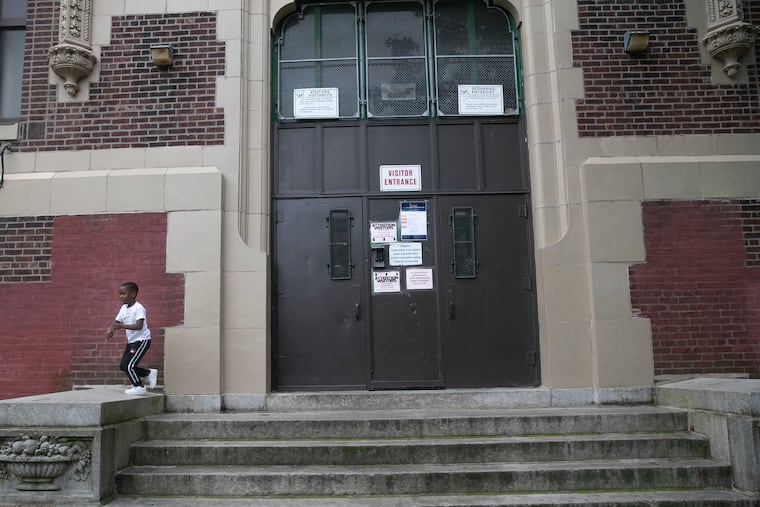As virtual vs. in-person debates wage, the bigger conversation about schools is lost | Opinion
Why is location the crux of the argument? Instead, we should be arguing about how to fix a system that is broken, antiquated, and in dire need of fundamental changes.

“This is the most important school year of our lifetime.”
This phrase sat atop the welcome slide in our all-staff virtual faculty meeting a few weeks ago. The topics discussed should surprise no one: civil unrest and protests; achievement gaps, inequality, and inequity for Black and brown students; COVID-19 and the question of virtual learning vs. in-person instruction.
Welcome to the 2020-21 school year.
The message gave me pause. 2020, nightmarish in so many ways, is an opportunity for education nationwide. And yet, as is so often the case, the nationwide debate thus far has been unproductive and has done little to improve education for students.
» READ MORE: Philly students head back to class, virtually; education leaders demand more funding
After more than a decade teaching, from middle school to university, and from Michigan to Maryland to Pennsylvania, there is one constant: Public schools are in need of a new vision.
But the current debate does not reflect this need. Instead, talking heads, school leaders, and politicians debate where to continue providing the sub-par education we have been providing for years. In the most simplified version, the sides are:
Those arguing for a return to in-person education argue that virtual learning is causing more harm to our poorest and most at-risk students. The data from the past months, while limited, proves them right. The students who were most at-risk prior to our nationwide COVID shutdown are even more at risk of falling behind now, and mental health issues are on the rise.
On the other side, we have those arguing that sending students back to school in person can only result in a further spreading of the disease and a continuation of the pandemic we have struggled as a nation to control for most of this year. They point to schools in Florida and Georgia, which opened in person and have had spikes in cases as evidence of the danger. They argue that virtual learning, while not as good as in-person education, is the only responsible solution that will allow students to learn and remain healthy. They say it’s just not worth it to expose students and faculty to this risk.
I have watched this debate all summer, following the news closely to see whether I would be back in front of students in a classroom this fall. But as I watched, and heard the arguments about the virus and achievement gaps and the economy and socialization and mental health, I found myself wondering frequently why we aren’t shifting the argument to something else, something less likely to end in frustration and stalemate.
And that is why I say that those arguing over whether we need to go back to school in person or virtually have missed the point. Going back in person will do little to help fix the achievement gap. Even if students do go back to school buildings, there will be little socialization as we knew it previously. Students will be divided, masked, and limited in their movements and interactions.
» READ MORE: Zoom and gloom: Virtual schooling has begun, and it is unsustainable | Maria Panaritis
So, while location is the key issue of the moment, why is it the crux of the argument? Why are we not instead arguing about how to fix a system that is broken, antiquated, and in dire need of significant and fundamental changes? Right now, when every educational system in our nation is scrambling to find the best way to deliver learning, is the perfect time to examine what is broken (reliance on standardized testing, inadequate implementation of technology, unequal and inadequate funding, and a refusal to adapt to an ever-changing world to start) and begin creating a new system that will remedy many of the ailments that have hampered American education for the last 20 years.
Why aren’t we arguing about the future of public education, and, on an even grander scale, the future of our nation as a world power? Because if we want to not only stay powerful but even stay relevant, it needs to start in our schools.
Our schools, whether we teach in person or via online learning platforms, are not doing what they are supposed to: preparing our young people to be thoughtful, intelligent, and competent citizens. This is evident in the interactions we see on social media and in our streets, where people are no longer having productive discussions and debates, but are instead victimizing and ridiculing and attacking one another, both literally and figuratively. Many schools use a model of teaching that hasn’t been changed substantially in 60 years, namely a centralized, top-down dissemination of information that relies on rule-following and values orderliness over thoughtfulness, and this system does not prepare students for open discourse or citizenship. It does not engage them in the right ways, and it does not prepare them for life after school.
Schools are failing students, and it has nothing to do with COVID-19, virtual classrooms, or technology. It has to do with schools not adapting, and it is time the conversation actually focuses on that.
Our future depends on it.
Marc Macdonald is a writer and educator living in Philadelphia.